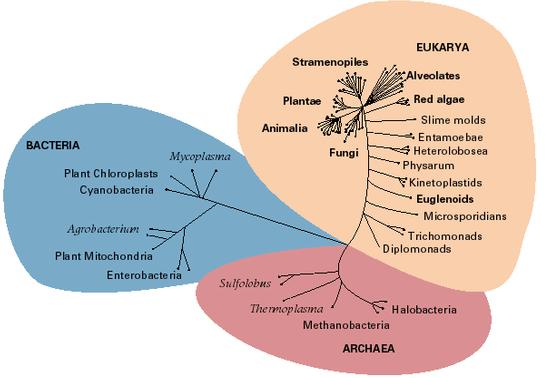Three Domains
From Paleos
The Three Domains of Life include the Archaea, including the halophiles, methanogens, and thermophiles, the Eubacteria, including gram-positive and gram-negative bacteria, and cyanobacteria, and the Eukarota, including protists, plants, animals, and fungi.
Modern genetic research over the last decade or so has revealed that anaerobic bacteria found in harsh oxygen-free conditions are genetically and metabolically completely different to other, oxygen-breathing organisms. These bacteria, called Archaeobacteria, or simply Archaea, are actually "living fossils" that have survived since the planet's very early ages, before the Earth's atmosphere even had free oxygen. DNA and RNA analysis has shown that instead of five kingdoms there are actually three "Domains", Archaea, Bacteria, and Eukarya (Eukaryota). This last group refers to organisms whose genetic material is contained in a special membrane as the nucleus, and includes all higher organims from protists to humans. Rather than just four kingdoms it would seem to include over a dozens. So much so that the term "Kingdom" has become (in this usage) meaningless. So we have:
| two kingdoms | five kingdoms | three domains and who knows how many "kingdoms" | |
| Animalia | Animalia | Eukarya | Animalia |
| Plantae | Fungi | Fungi | |
| Plantae | Plantae | ||
| either Protozoa (=Animal) or Algae (=Plant) | Protoctista | Alveolata | |
| Stramenopiles | |||
| etc... | |||
| Sporozoa | |||
| Mycetozoa | |||
| Euglenozoa | |||
| etc... | |||
| Archezoa | |||
| Plant (bacteria and blue-green algae) | Monera | Eubacteria | (kingdoms not specified) |
| Archaea | Euryarchaeota
Crenarchaeota |
||
Thus the diversity of life is seen to be far more complex than was envisaged, and familiar organisms like animals and plants are just a tiny proportion of all of the many different forms.
The following diagram illustrates the relationship between the Three Domains, and the various subbranches of each.
External References
UCMP The Biosphere: Life on Earth - Three Domains of Life
The Whittaker System - useful diagram
Illinois State Academy of ScienceThe Kingdoms Project The Kingdoms Project at the ISAS

